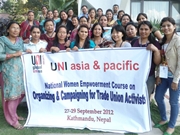National Empowerment Course: Women Leaders in Nepal

As part of UNI Apro Women’s efforts to empower more women unionists, the workshop aimed to familiarize women with the local and international union movement as well as to develop their communication skills so that they can be more active in their unions and communicate confidently with members, non members and the management. Women leaders and members representing affiliate unions participated in the course.
Women in Nepal have little chance to participate in decision making processes and often face discrimination in post, position, salary and wage. These are related to religious and social obstacles, such as women’s diversified responsibility at home and in the office, and a general subordination of women as objects rather than humans.
Maintaining work-life balance is an even tougher problem for women and should be tackled by both unions and organizations.
Hence, increasing women participation in unions is a necessary step in achieving this. Unions protect the rights of women workers and ensure that their voices are heard. By giving women access to the decision making level, unions provide mental, physical and social protection, and more importantly, remedy their social stigma.
The training course was conducted in both English and Nepalese language. Resource persons from UNI APRO, UNI NLC and two guest resource persons with experience of trade unionism helped made the training a success.
The group said that taking leadership positions is only possible with more education and awareness programs on their rights and about trade unions, assessments to convince women of their worth, provision of positive discrimination, as well as an increase of women’s participation in decision making process.
Organizing more social activities and gatherings can also pull more women into unions. Women workers appreciate when unions help lower down their work load through initiatives such as cooperatives, laundry, and child care so that they can balance work, life and union.
In addition, participants agreed that having quotas in the initial phase at every trade union level may help achieve remarkable percentage of women in unions.
While women participants concluded that economic, social, political, and psychological reforms are needed to organize more women into trade unions, they were all eager to implement the learning of the course to their unions and organize more women into trade unions.

